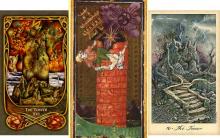CHATSKY AND
MOLCHALIN
Since
the appearance of the comedy “Woe from Wit” has passed
more than 170 years old, and it is still fresh and
interesting for us, today's readers and
spectators. Interesting not only to the living,
aphoristic language, but also because the heroes
The plays are easily recognizable in modern life.
If
take a closer look,
even now you can meet honest ones,
hot people, boldly, without visor
speaking out against life's ugliness, and this
people like Chatsky, as well as their antipodes
- quiet, insinuating careerists,
office rats like Molchalin. Chatsky and
Molchalin are people of the same generation, but they
represent two completely different
public groups.
In the image
Chatsky Griboyedov embodied the features of the “new
human”, democrat, humanist,
opposing reactionary society
in defense of freedom, education, national
culture.
Molchalin
with those against whom they are directed
Chatsky's accusatory monologues, he
opportunists, admirers of rank,
mind stranglers.
Chatsky
represents the present age and, moreover, the age
the future, and Molchalin is the representative of the century
of the past. Therefore, diametrically
their worldviews are opposite and different
life principles.
Chatsky
angrily denounces serfdom, the “robbers of the rich”,
and Molchalin sees the highest happiness in
“and win awards and have fun.” By
in the opinion of the first, one must serve “the cause, not
persons”, without groveling, because “to serve
sickening,” and another confesses:
Bequeathed to me
father:
Firstly,
please all people without exception* -
To the owner,
where you will live,
To the boss,
with whom will I serve...
One
is indignant that judges are recognized in society
those who hate freedom of speech, and “judgments
they draw from forgotten newspapers,” and the other is sure
that in his years “shouldn’t dare to
have the judgment” that “one must depend on
others.”
Chatsky
I am outraged by the Molchalin philosophy
voluntary slavery, but he gives himself
the report is that Molchalin “will reach
well-known degrees, because nowadays they love
dumb." The hero himself is not like that. Everyone
with his appearance, angry, passionate speeches
he emphasizes his independence,
independence of thinking. And it is clear that with
with such a character and structure of thoughts, a career is not
you will do it. According to Herzen, Chatsky is “a man
December 14, walking the straight road to
hard labor.”
“The quietest”
Molchalin is a significant opponent of the main
hero. And not because everyday truths, they
preached
but because he does everything subtly,
courteously, insinuatingly. “Here he is
tiptoe and not rich in words...”, “helpful,
modest”, but achieves his goal
gradually: Famusov took him as secretary, gave him
the rank of assessor, Sophia is in love, and the old woman
He calls Khlestova: “my friend.”
So
way, Chatsky with his intelligence and abilities
loses where Molchalin finds. And although
the main character does not accept him as
antagonist in the public sphere,
Molchalin is dangerous in historical terms.
Just like him, unnoticeably, in the shadows
climb to prosperity, strength and power,
strangling the living, blissful in the world. But still
their defeat is inevitable. Author, expelling
frightened Molchalin from the stage in
last action, expels him from
life
society, emphasizing the historical strength and
Chatsky's correctness.
Essays on literature: Chatsky and Molchalin."Woe from Wit" by Griboedov is a socio-political realistic comedy, "one of the most topical works of Russian literature." The comedy "Go" was written in the 20s of the 19th century, when after Patriotic War In 1812, changes took place in Russian society, when dissatisfaction with the existing order was brewing among the progressively minded nobility. The author reveals the content of the main conflict of the era: the collision of the “present century” and the “past century”, which does not want to give up its positions. The ASG contrasted the main character with the rest of the characters, representatives of the conservative part of society. The author himself pointed this out, explaining the main meaning of his comedy: “In my play there are 25 fools for one sane person.” The role of Alexander Andreevich Chatsky - the main role in comedy. Among the “twenty-five fools”, Alexey Stepanovich Molchalin is of great importance. Chatsky and Molchalin are not only stage characters who contribute to the development of the action, but also social types.
Chatsky and Molchalin are approximately the same age, but in everything else they are sharply different from each other. They oppose each other, and this opposition manifests itself in both love and public conflicts. Chatsky is talented, “his speech is full of intelligence and wit,” he always says what he thinks, “he has a heart, and, moreover, he is impeccably honest.” Molchalin’s “talents” consist of “moderation and accuracy.” Behind the mask of the wordless, modest, quiet, helpful secretary Famusov hides an unprincipled careerist, a heartless and hypocritical egoist. Chatsky comes from a noble family. He is a hereditary nobleman and received a good education. Alexander Andreich has a rich life experience, he traveled a lot, lived both in the village and abroad.
Chatsky calls the “present century” the age of enlightenment and in every possible way praises the craving for knowledge, sciences and arts, “high and beautiful.” The rootless tradesman Molchalin was probably brought up worse than Chatsky. And if not for Famusov, Molchalin would have had to “smoke in Tver,” that is, serve with a minimum salary and almost without any opportunity to advance. However, Molchalin “inherited” one very “valuable” piece of advice from his father: My father bequeathed to me: First, to please all people without exception - the Master, where I happen to live, the Chief, with whom I will serve, his Servant, who cleans dresses, the Doorman , to the janitor, to avoid evil, to the janitor’s dog, so that it is affectionate. For Molchalin it is impossible to imagine a successful life without promotion. A career for him is the shortest and easiest path to honors and nobility. He associates service not with a sense of duty to the fatherland, but with awards and ranks. So, Alexey Stepanovich Molchalin has already received “three awards” and noble title. Chatsky does not demand “neither places nor promotion to rank.”
He is ready to serve at the behest of duty, to “serve the cause”: I would be glad to serve, but it is sickening to be served. Chatsky, possessing a Decembrist worldview, appears in the comedy as an uncompromising fighter against the landowner-autocratic system. The meaning of Molchalin’s life is “to win awards and have fun.” The heroes' attitudes towards love are also opposite. Chatsky loves Sophia purely, sincerely. After all, it was only for her that he came to patriarchal Moscow.
Molchalin is not capable of deep and sincere feeling: And so I take on the form of a lover to please the daughter of such a person... He loves Sophia “by position”, Lisa - “out of boredom”. Love for him is another means to achieve his base goals. Alexander Andreich is a freedom-loving hero. He does not take into account the opinion of the world, does not depend on anyone, he does not attach of great importance connections in society, he does not need patronage. Chatsky fearlessly says what he thinks about the “aces”. If " empty man“in the “Famus society” they are “put as a model,” then this means absolutely nothing to Chatsky. Foma Fomich, as he was, will remain for Alexander Andreich “one of the most stupid,” and the imperious and powerful Tatyana Yuryevna is “absurd.”
Moreover, Chatsky will passionately denounce class prejudices conservative nobility. This is the main difference between Chatsky and Molchalin. Molchalin firmly follows his father’s “will”: There he will pet the pug in time! It's time to rub the card in! But this desire to please everyone has for him also negative side. Molchalin might be happy to express his opinion, but he cannot.
He says: “At my age I should not dare to have my own opinion.” Dependence on others is a necessity for him. Morally, Chatsky is undoubtedly much richer than Molchalin. Chatsky does not take Molchalin seriously, does not see him as a worthy opponent, for him Molchalin is a complete nonentity, “a most pitiful creature.” But Molchalin doesn’t value Chatsky, who in his eyes is an ordinary loser. Chatsky underestimated Molchalin, and Molchalin did not understand Chatsky’s worldview at all.
Chatsky - new person. “Famusov’s society” stands in his way, but the Molchalins turn out to be stronger and more tenacious. “Silent people are blissful in the world!” These words of Chatsky turned out to be prophetic: Silent people are eternal. But such heroic personalities as Chatsky will always appear during the abrupt change of one century to another.
And this testifies to the true “immortality” of comedy. Chatsky is defeated, but morally remains a winner. Chatsky, endowed with temperament and a lively mind, is actively fighting against Famus society, but he does not see his main opponent, Molchalin. Main character is not able to take him and his “abilities” seriously, but in fact this “most pitiful creature” is not so insignificant. During his absence, he took a place in Sofia's heart. The words thrown by Chatsky - “Silent people are blissful in the world” - turned out to be prophetic. It is precisely people of this type, whose ideal is “to win awards and have fun,” who, in the opinion of the protagonist, will rise to the top of society because the authorities value “moderation and accuracy,” as well as “the dumb.” Intelligence, cunning, resourcefulness, ability to find the “key” to everyone to an influential person- the main qualities of Silent. His views on life are opposite to Chatsky's ideals.
In this way, Molchalin is similar to Famus society. During the three years of Chatsky's absence, he achieved incredible success. An unknown, rootless tradesman received the rank of assessor and became Sofia's lover. Calculatingly and coldly, he gains strength, stopping at nothing, even deceiving a defenseless girl. He is ready to endure any humiliation in the struggle for power. No one can stand in his way. Chatsky not only rejects outdated forms of life, but also encourages everyone to do so. The main character is a caring, active person, it even seems to me that he typical representative Decembrists.
He despises sycophancy, passion for rank, and spiritual emptiness. His speech is full of intelligence and wit. He is an honest person with a healthy sense of humor who sees the shortcomings of others and openly ridicules them, without fearing anyone. All this nobility is the opposite of Molchalin’s qualities. With this work, the author calls for a fight against people like Molchalin and Famusov. It seems to me that such people still exist today because it is very difficult to “unravel” their deceitful natures and they always find “weak” people to boss around. It follows from this that Famusov and Molchalin society is growing and developing.
Griboedov's comedy "Woe from Wit" is an outstanding work of Russian and world drama. The author poses and resolves problems that were important for his time: about public service, about patriotism, about human relationships. It shows grief smart person forced to live in a society alien to him. The main character of the comedy is Alexander Andreevich Chatsky. This is a young, educated nobleman. He is noble, honest, smart. He is struck by the emptiness and vulgarity of life in Moscow society. The main character exposes his vices: groveling before his superiors, servility and servility. Chatsky wants to serve the Fatherland, and not some “persons”: “I would be glad to serve, it’s sickening to be served.”
He condemns the Moscow nobles who are trying to “recruit teachers for the regiment, in larger numbers, at a cheaper price.” In this society, Chatsky is a stranger. He turned out to be a lone fighter. Exhausted by this struggle, he leaves: Get out of Moscow! I don't go here anymore. I’m running, I won’t look back, I’ll go looking around the world, Where there is a corner for an offended feeling!..
This article discusses two of the most famous hero Griboyedov from famous comedy“Woe from Wit” - Chatsky and Molchalin. An essay in which it is necessary to compare these characters has long been included in school curriculum. In this article we will present a plan possible composition and consider its points. In addition, we will conduct detailed comparative characteristics heroes.
Essay “Woe from Wit”: Chatsky and Molchalin.
A plan for any speech development task that involves writing your own text is impossible without detail. Let's try to compose it:
- A short description of the comedy.
- Description of the image of Molchalin.
- Description of the image of Chatsky.
- Comparison of heroes.
- Summarizing.
About the product
The main characters of the play “Woe from Wit” are Chatsky and Molchalin. It is better to start the essay with a description of the work itself.
So, in the comedy, the author reflected the morals and behavior of society in the period from 1808 to 1824, and the action itself takes place after the War of 1812. Griboedov raises the most important problems of this time: patriotism, public service, serfdom, decadence in the spheres of education and enlightenment, human relationships. And all these issues are considered from two angles - from the point of view of people " this century" and "the century of the past." It is in the struggle of Molchalin and Chatsky that the struggle of these generations is most clearly reflected.
Image of Molchalin

But why are Chatsky and Molchalin so different? The essay should provide a comprehensive answer to this question. Let's start by considering the image of Molchalin. He has his own ideals, beliefs and purpose in life. These are his goals - a high position in society, career growth, wealth. For Molchalin, the meaning of life lies in one’s own well-being: “to have fun and win awards.” To achieve his goal, he is ready to do anything - cunning, flattering, deceiving, dodging. This is what he himself says about it: “to please everyone without exception.” But this applies only to those who are higher in rank. With those who are lower than him, he does not stand on ceremony.
The image of Chatsky
We started talking about how Chatsky and Molchalin are different. The essay must include characteristics of both characters, so let's talk about Alexander Chatsky. He is an educated young nobleman, distinguished by progressive views, a typical representative of the “present century.” Chatsky is ready for selfless service to the Fatherland and wants to benefit people. The hero despises careerism, veneration, hypocrisy and pretense. This character is very close to the Decembrists in his beliefs. Chatsky does not approve of serfdom, treats the Russian people with respect, respects national culture and the Russian language. He treats Molchalin with obvious contempt.

Attitude towards love
Our essay moves on to describe the heroes’ relationship to love. Chatsky and Molchalin, whose characteristics are presented here, represent this feeling in completely different ways and treat Sophia accordingly.
Chatsky is sincerely attached to the girl and loves her with all his heart. It is only for the sake of Sophia that he decides to return to Moscow. However, his feelings are rejected that he for a long time cannot accept.
Molchalin deceives Sophia, pretending to achieve advancement in career ladder. Despite his youth, Molchalin belongs to the “past century.” For him, the morals and manners of old Moscow are elevated to an ideal, which is why he is accepted by society with such cordiality.
At the same time, Chatsky gives in too much to his own emotions and does not notice Sophia’s feelings. Molchalin remains cold and calculating. He is incapable of strong feelings.
Comparative characteristics of Chatsky and Molchalin (essay)

You can compare characters in a number of ways:
Molchalin |
||
Character | A sincere, passionate, straightforward young man. feelings often prevent him from soberly assessing the situation. | Helpful, cautious and very secretive. The main goal is a career and a high position in society. |
Social status | Moscow nobleman without great fortune. He is received warmly because of his background and connections. | A tradesman from the provinces. Known in the world, but has no weight. |
Education | Very enlightened and smart. Received a good education. | Very limited person, whose judgments are primitive. Didn't receive a decent education. |
Field of activity | Has no position. There are mentions that he served in the army. | |
Social views | Freethinker and patriot. He is not afraid to be indignant at the orders prevailing in society. | Absolutely accepts and respects the existing system. |
Career views | I am convinced that high rank Only sycophants can achieve this. He believes that he has no prospects. | Ready to do anything for the sake of a career - endure humiliation, make connections. He takes his service very seriously. |
Features of speech | Eloquent and witty. He speaks Russian, but can also insert French sentences. | Official, very respectful speech. When communicating with senior ranks, he begins to flatter and fawn. |
Relationship to each other | Treats Molchalin with contempt. He believes that he has no merits. Tries to make fun of him at every opportunity. | He perceives Chatsky neutrally. Treated with respect. But he doesn’t see any benefit for himself in this person. |
Humiliated and insulted, he leaves Moscow. He is disappointed in love and rejected by society. | His fate is not determined, since Famusov does not know about Molchalin’s connection with his daughter. The hero can continue to serve. |
|
Role in a comedy | The main character around whom all the conflicts of the play develop. | Main antagonist. He is the embodiment of ossification. |
Results

Our essay is coming to an end. Chatsky and Molchalin are opposed to each other in the comedy “Woe from Wit”. The author does this in order to make the characters’ characters appear more clearly. Griboedov, using the example of these characters, characterizes the present and past centuries, and the reader must draw conclusions. The author’s position is clear - he takes Chatsky’s side.
Despite the fact that two centuries have passed since the masterpiece was written, the comedy has retained its relevance today.
The comedy "Woe from Wit" by Alexander Sergeevich Griboedov became an event in Russian literature early XIX century, was a rare example of its accusatory, satirical direction. I.A. Goncharov wrote that in the comedy “the main role, of course, is the role of Chatsky, without which there would be no comedy, but there would, perhaps, be a picture of morals.” In the image of Chatsky, Griboedov, for the first time in Russian literature, showed in full growth a “new” man, inspired by lofty ideas, raising a rebellion against a reactionary society in defense of freedom, humanity, intelligence and culture of man, inquisitively searching for new, more perfect forms of life, nurturing a new morality, developing a new view of the world and human relations. This is the image of a brave and irreconcilable fighter for a cause, for ideas, for truth, acutely confronted with a society of reactionaries and serf owners, slandered and insulted by this society, but not humbled before it.
It was Chatsky who embodied the features of such a “new” person. In Famus society, Chatsky feels lonely. After a three-year trip abroad, without stopping at his home, straight from the carriage, he appears at Famusov’s house and meets with a very cool reception - both from the owner and from his daughter. His first glances provoke a sharp rebuff from Famusov and his guests, and Sophia, ardent with love, encounters a cold, indifferent attitude on her part. According to Chatsky, the “past century” is characterized by universal fear, humility and servility - after all, “he was famous, whose neck bent more often!” “The present century,” according to Chatsky, condemns obedience and servility. He still naively believes in this. Later, as the play progresses, he will understand that “The silent ones dominate the world,” that “the meanest traits of the past life” still have strong roots in a society based on autocracy and serfdom. By “the present century” Chatsky understands; revolutionary liberation movement of Russian social thought late 10's early 20's of the 19th century. These passionate speeches of Chatsky evoke Famusov’s genuine fear: “He wants to preach freedom!”
Chatsky's monologue "Who are the judges?" is noteworthy. Chatsky passionately denounces socially recognized authorities. He feels like a man of “the present century.” In his monologue, Chatsky speaks on behalf of the new generation: Where, point out to Us, are the fathers of the fatherland... This is who we should respect in the wilderness! Here are our strict connoisseurs and judges! Who are we? Who did Chatsky mean here? "Judges" who are irreconcilable with " free life", he contrasts the younger generation, who follow different paths. In their views on social order, on upbringing and education, civic duty and service, national culture, in remembering the meaning and purpose of life, Chatsky opposes the society of ignoramuses and serf owners. Gossip and slander are the main weapons of this society’s fight against people like Chatsky. An accurate, free, fiery word is Chatsky’s weapon. This is a powerful, truly devastating weapon. But old world still strong. And the ranks of his supporters are numerous. Chatsky is forced to flee from Famusov’s house and from Moscow “to search the world where there is a corner for an offended feeling.” However, Chatsky’s flight from Moscow cannot be perceived as his defeat.
The Chatskys deal a terrible blow with their denunciations of Famus and Silence. The calm and carefree existence of Famus society is over. He was condemned, they rebelled against him, if the Chatskys are still weak in their struggle, then the Famusovs are powerless to stop the development of education and advanced ideas. This noble image in Griboyedov’s comedy is opposed by the image of Molchalin. If Chatsky is the son of a noble Moscow nobleman and he was brought up in his house, then Molchalin is a man of lower origin. Out of mercy, he was “warmed up” by Famueov, although, of course, he “needed” him. Molchalin has many business qualities, sufficiently educated. Chatsky was wrong to underestimate Molchalin. His silence is not stupidity at all. It is no coincidence that Belinsky wrote that “Molchalin is devilishly smart when it comes to his personal conclusions.”
The clash between the Chatskys and Molchalins is a conflict between the bearers of the opposite qualities of the noble youth of that time. Molchalin, unlike Chatsky, an intelligent and noble man, is smart and mean. The main qualities of his nature are baseness and meanness, which he skillfully hides. He is dumb only because he is “in low ranks.” This is a calculating player who will sell anything and anyone for the sake of his well-being. What cynicism and baseness must one go to in order to take advantage of a rich man's daughter falling in love with himself! Molchalin needs Sophia because she can “put in a good word.” For the Famueovs and Molchalins, their intelligence brings only benefits. Chatsky suffers from his progressive, freedom-loving mind. Not by chance Famusov society declares Chatsky insane. Molchalin does not suffer a fiasco in the eyes of Famusov completely by accident. He is a “master of service” and will find himself a new patron. If Chatsky, as Herzen put it, “goes the direct route to hard labor,” then Molchalin will arrange his affairs and his career in any way. And yet, history has proven that victory will remain with such true patriots as Chatsky.
"Woe from Wit" - realistic work, where A.S. Griboedov gives a picture of the life of serfs in Moscow in the nineteenth
century. The content of the comedy is revealed primarily as a clash and change of two great eras of Russian life - the “century
present" and "past century". It (the clash) was an expression of the struggle between two political camps - the feudal camp
reaction, defenders of serfdom in the person of Famusov, and the camp of advanced noble youth, whose image is embodied
Griboyedov in Chatsky.
The world of the Famusovs consists not only of feudal aces like Famusov and Skalozub, but also of those who serve them,
fawning officials - silent ones. If Famusov and Chatsky are people of different generations, then Molchalin and Chatsky are
peers. The sharper the contrast between them. They oppose each other, and this opposition manifests itself both in love,
and in social conflicts. Molchalin is a staunch conservative, therefore the dialogue and mutual understanding between him and Chatsky
are impossible, and conflict is inevitable - their life ideals and behavior in society are absolutely opposite.
Molchalin is poor and rootless, but he set himself the goal of achieving “the level of famous.” And if it weren’t for Famusov,
Molchalin would have had to “smoke in Tver,” that is, serve with a minimum salary and almost without any opportunity
advance. However, Molchalin knows how he needs to behave:
First, please all people without exception -
The owner, where he will live,
To the authorities with whom I will serve,
To his servant who cleans dresses,
Doorman, janitor, to avoid evil,
To the janitor's dog, so that it is affectionate.
Like Skalozub, Molchalin “has many channels to get rank.” For several years spent in Moscow, he managed
have a good career. But the main thing is that he managed to establish the necessary connections and acquire useful acquaintances. Unlike
Chatsky, Molchalin fits into Famus society. This is “little Famusov”, because he has a lot in common with the Moscow
"ace". For example, Molchalin’s attitude towards service is purely “Famusov’s”: he would like to “win awards and have fun
live." Molchalin considers dependence “on others” to be the basic law of life. Chatsky cannot understand “why are opinions
strangers are only holy.” Public opinion is sacred for Molchalin: “Ah! gossips scarier than a pistol."
Chatsky comes from a noble family. He is a hereditary nobleman and received a good education. Chatsky has
Rich life experience, he traveled a lot, lived both in the village and abroad. Chatsky calls “the present century”
century of enlightenment and in every possible way praises the craving for knowledge, sciences and “high and beautiful” arts. Chatsky does not require
“no places, no promotion to rank.” He is ready to serve at the behest of duty, to “serve the cause”: “I would be glad to serve, to serve
sick."
Chatsky is talented, “his speech is full of intelligence, wit,” he always says what he thinks, “he has a heart, and, moreover,
he is impeccably honest." Molchalin’s “talents” consist of “moderation and accuracy.” He is modest and helpful, because
that “in the ranks of “small”” cannot exist without “patrons.” Molchalin is a man devoid of dignity and honor, ready
to humiliate himself, to fawn, a person who does not have “his own judgments”, dependent on others. Slave morality is unacceptable to
Chatsky. “Why are other people’s opinions only sacred?” - he asks Molchalin with irony. He himself freely and directly expresses
his opinions, does not take into account the opinion of the world, does not depend on anyone, he does not attach much importance to connections in society,
he doesn't need patronage. Chatsky fearlessly says what he thinks about “aces”. If the “emptiest man” is placed in
sample, it means absolutely nothing to him. Foma Fomich, as he was, will remain for Chatsky “one of the most
stupid”, but powerful and well-connected!
Tatyana Yuryevna is “absurd.” For Chatsky, Molchalin is a complete nonentity, “the most pitiful creature”:
Helpful, modest, with a blush in his face.
Here he is on tiptoe and not rich in words.
In turn, Molchalin does not value Chatsky at all. In his eyes, Chatsky is a loser: “You were not given ranks,
service failure?
Molchalin is the antipode of Chatsky not only in his beliefs, but also in the nature of his attitude towards Sofia. “Warmed” by Famusov,
he deftly plays the role of a man in love with Sophia:
And now I take the form of a lover
To please the daughter of such a man
Chatsky’s love for Sophia is a sincere, ardent feeling. There is no secrecy, no falsehood in him. He's firmly
I am convinced that Sophia cannot fall in love with Molchalin:
With such feelings, with such a soul
We love you!.. The liar laughed at me!
When Molchalin’s hypocrisy towards Sophia was revealed, he simply chickened out. He crawls humiliatingly in front of a girl
not because he feels guilty, but because his career may suffer. Molchalin will probably redouble his efforts to
make amends to Sophia. It is impossible to stop the career of a person like Molchalin; he will “reach the degrees
famous."
Alas, “The silent ones are blissful in the world.” Chatsky underestimated Molchalin, he suffers defeats, but morally
remains the winner. Personalities like Chatsky “live and are not translated in society; they will always appear” when
sharp transitions from one century to another."











What is consolidated reporting?
Statutory audit - grounds for conducting an audit
What can you cook from chicken?
How to fry pasta in a frying pan
Instant cabbage pieces: recipes for pickling with carrots and beets